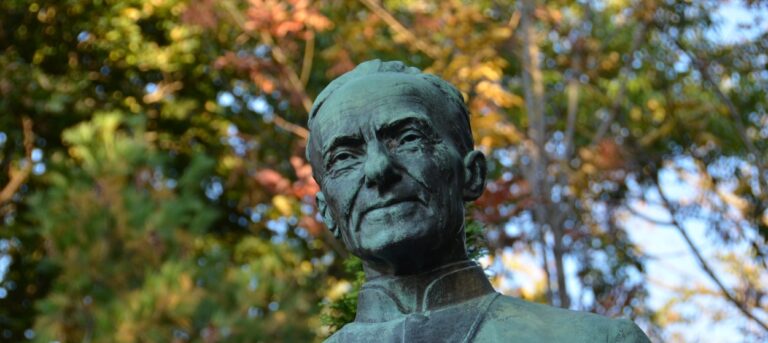
“THAT WHICH MAKES YOU FEEL THE MOST ALIVE….THAT IS WHERE GOD IS.”
Faith development and spiritual growth almost always require change. We are called by God to be consistently a work in progress. It is important to remember that God speaks and we respond. Our response can be varied in how we answer and also how long it takes for us to react. St. Ignatius of Loyola (1491-1556) represents most of us who believe in God, attend Mass and prayerfully respect the Church, but perhaps have never fully gained an intimacy with Jesus. The attraction to the worldly can often become a stronger magnet and God does not capture our full attention. However, life experiences and graced moments can bring us further into the mystery of the Divine and create change or conversion that moves us in different spiritual directions, action and love. Such was the case with Ignatius.

The Society of Jesus, as the Jesuits are called, was founded in 1541 by the Spanish born nobleman Ignatius of Loyola and a few comrades. The youngest of a large family, Ignatius served in the military. He was considered brave and strong but he boasted about his own importance as a renowned soldier. He led a colourful life and dearly enjoyed all the pleasure and adventure the world offered him. A serious Injury sidelined him for a time and it was during this period of convalescence that he was given books to read about the life of Jesus Christ and the lives of the saints. These books were not of his choosing but he read them anyway. These stories moved Ignatius and he began to see himself in a mirror and decided that heroism, bravery and nobility could take another form. He felt humbled and impressed by literature detailing the lives of saints who totally gave themselves over to God. Ignatius decided that a selfless life far outweighed a selfish one and his interest shifted from pleasing himself to pleasing God and others. This was his metanoia.
There were many things about Ignatius that I am certain defined him and later allowed him to use his talents in the service of the Lord. His military action did cause him injury multiple times. One complication was a shattered broken leg that was extremely painful and repaired without the use of pain medication or anesthetic that we take for granted today. This strength served him well when he was told that the leg needed to be re-broken and reset in order for him to walk properly. Ignatius went through the pain once more. That same fortitude and bravery must have been present when he decided to transform and turn to God. To change takes strength. The metaphor of breaking, healing, and breaking again; yet, continuing to desire to make things right, demonstrates not only physical frailty but shows determination to get well. We all go through these “broken” times and need to “re-set” the problem that prevents us from walking our faith journey. Sometimes the process is indeed painful.
I was in the very last graduating class at Loyola College of Montreal in 1974 before the name was changed due to an amalgamation of two colleges which created the now known Concordia University. Loyola of Montreal was a Jesuit affiliated institution with a fine academic and spiritual reputation. I was honoured to have had that experience. It was there that I first heard of the Spiritual Exercises of St. Ignatius which are comprised of reflection, prayers, and contemplative practices. I also was captivated by the notion that in order to read scripture, one had to imagine themselves in that scripture passage as a participant and truly walk with Christ in order to understand his mission and our own. I carry this spiritual approach with me to this very day. In the Quebec town where I grew up, we often had difficulty finding priests to come to our small English speaking Catholic community to pastor our flock. One who did and remained for a period of time was a Jesuit who also shared his Ignatian spirituality with us and gave us much academic and spiritual food on which to chew. St Ignatius used his God given talents for God’s glory. We all need to explore this in our own lives. What gifts do we have that we can use to deepen our relationship with God and allow us to serve others? Ignatius also saw the value in community and the Jesuit order grew as a result of this one man’s desire to change and set about on a new path for Jesus. Others soon followed. He died on July 31, 1556 and was canonized on March 12, 1622. (FUN FACT: Pope Francis, officially became a Jesuit on March 12, 1960 making his vows as a member of the Society of Jesus) I am sure Ignatius was looking down upon him! Along with other associations, St. Ignatius of Loyola is considered to be the patron saint of soldiers. I like to think of him as my own patron saint of “willingness to change and discerning well.”
St. Ignatius of Loyola, pray for us!
–Jim Dunn, Novalis author
“Nothing is more practical than finding God, than falling in love in a quite absolute, final way.” -Pedro Arrupe S.J., 1907-1991


